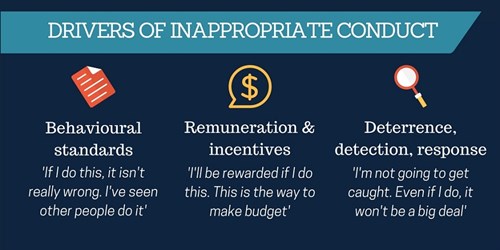Market Integrity Update - Issue 83 - June 2017
Issue 83, June 2017
- ASIC accepts enforceable undertaking from Macquarie Bank to address inadequacies within their FX businesses
- Driving better behaviour in the wholesale spot FX market
- Citigroup pays $50,000 infringement notice penalty
- Former director jailed for dishonesty
- Trust in a digital world
- End of financial year ‘window dressing’
- Stories from the beat
ASIC accepts enforceable undertaking from Macquarie Bank to address inadequacies within their FX businesses
 We have accepted an enforceable undertaking (EU) from Macquarie Bank Limited (Macquarie) in relation to their wholesale foreign exchange (FX) businesses.
We have accepted an enforceable undertaking (EU) from Macquarie Bank Limited (Macquarie) in relation to their wholesale foreign exchange (FX) businesses.
Following an investigation we became concerned that, between 1 January 2008 and 30 June 2016, the bank failed to ensure its systems and controls were adequate to address risks relating to instances of inappropriate conduct identified by ASIC.
Under the EU, Macquarie will develop a program of changes to its existing systems, controls, training, monitoring and supervision of employees within its FX business.
ASIC has now accepted undertakings from some of Australia's largest financial institutions. The EUs require each of these institutions to put in place forward-looking processes and controls to ensure that their FX businesses provide financial services honestly, efficiently and fairly.
ASIC Commissioner Cathie Armour said, 'The wholesale spot foreign exchange market is one the world's largest financial markets and the proper functioning of this market is of vital importance to the Australian economy.'
'ASIC will continue to ensure that there can be ongoing confidence in how our financial institutions conduct themselves now and into the future.'
Macquarie will also make a community benefit payment of $2 million to The Smith Family to support The Smith Family’s financial services program aimed at improving young people’s understanding of money management.
Our investigations into the wholesale FX market have also seen ASIC accept EUs from ANZ, CBA, NAB and Westpac.
Driving better behaviour in the wholesale spot FX market
 We have released a report that draws on observations from our investigations into the wholesale spot FX market. Report 525 Promoting better behaviour: Spot FX looks at the key behavioural drivers of conduct within the FX businesses of major Australian financial institutions.
We have released a report that draws on observations from our investigations into the wholesale spot FX market. Report 525 Promoting better behaviour: Spot FX looks at the key behavioural drivers of conduct within the FX businesses of major Australian financial institutions.
The spot FX market is a key global market and is of systemic importance to the Australian economy, with a daily average turnover of US$31.4 billion in Australia. The effective functioning of the spot FX market relies on all participants acting with integrity and fairness.
Our investigations into the spot FX market uncovered conduct in some of Australia’s largest financial institutions that has fallen short of our expectations. While we have taken enforcement action where we have come across this behaviour, our focus has now moved to making sure this doesn’t happen again.
Report 525 takes a close look at the key behavioural drivers most likely to lead to poor conduct if not properly managed.

The report also sets out good practice principles for managing these drivers to more effectively prevent, detect and respond to inappropriate practices. We encourage all participants in FX markets to consider how these principles can be adopted to improve their internal arrangements for managing the risks of inappropriate conduct.
The release of Report 525 coincides with the release of Phase Two of the FX Global Code of Conduct (FX Global Code). The FX Global Code provides a global set of practice guidelines designed to promote the integrity and effective functioning of the wholesale FX market.
To help you manage the drivers of inappropriate conduct in your FX business, the good practice principles set out in Report 525 should be considered alongside the FX Global Code.
Citigroup pays $50,000 infringement notice penalty
 Citigroup Global Markets Australia Pty Ltd (Citigroup) has paid a penalty of $50,000 to comply with an infringement notice given to it by the Markets Disciplinary Panel (MDP) for contravening ASIC Market Integrity Rules (ASX 24 Market) 2010 that impose limitations on the disclosure of client orders, pre-arrangement of trades, and the execution of trades to the exclusion of other market participants.
Citigroup Global Markets Australia Pty Ltd (Citigroup) has paid a penalty of $50,000 to comply with an infringement notice given to it by the Markets Disciplinary Panel (MDP) for contravening ASIC Market Integrity Rules (ASX 24 Market) 2010 that impose limitations on the disclosure of client orders, pre-arrangement of trades, and the execution of trades to the exclusion of other market participants.
In July 2015, the Sydney sales desk of Citigroup was contacted by the Chicago sales desk of a related entity seeking information about the liquidity of NZ 90 day bank bill futures contracts on ASX 24. During the earlier night session, the Chicago sales desk of the related entity had placed a series of ‘iceberg’ buy orders with no resulting trades.
An iceberg order is generated by an algorithm, which slices the order into smaller orders and only submits one slice to the trading platform at a time. Only the slice is visible to other market participants, not the total size of the order.
A representative of the Sydney sales desk had a face-to-face conversation with a Sydney rates trader who was employed by a Citibank group entity. Iceberg buy and sell orders for 700 and 500 lots of the futures contracts were entered by the Chicago sales desk and the Sydney rates trader, resulting in a transaction of 500 lots of contracts at a certain price. The remaining portion of the iceberg buy order was cancelled, and a new iceberg buy order for 200 lots was entered at a lower price.
A squawk box conversation then ensued between the Sydney sales desk and the Sydney rates trader. An iceberg sell order for 200 lots at the original higher price was entered by the Sydney rates trader. Subsequently, the Chicago sales desk changed their buy order to match the price of the sell order, resulting in a further transaction of 200 lots.
Because of the timing and sequencing of the orders, conversations and trades, the MDP had reasonable grounds to believe that Citigroup had contravened the relevant ASIC Market Integrity Rules (ASX 24 Market) 2010.
The MDP noted that this was an isolated incident that did not result in any damage to the market. Citigroup has also undertaken remedial steps to prevent it happening again.
The compliance with the infringement notice is not an admission of guilt or liability, and Citigroup is not taken to have contravened subsection 798H(1) of the Corporations Act.
Former director jailed for dishonesty
 Former director, Gavin Keith Hyland, has been convicted on two counts of dishonestly using his position to misappropriate investor funds.
Former director, Gavin Keith Hyland, has been convicted on two counts of dishonestly using his position to misappropriate investor funds.
Between 8 March 2010 and 4 November 2010, in his position as a director of Jacqalex Pty Ltd (Jacqalex), Mr Hyland solicited and received funds from investors for the purpose of trading on their behalf in financial products, including shares, bonds and derivatives.
Mr Hyland dishonestly applied $104,110 of those investors' funds for his own personal use, including personal trading and using the funds to pay his credit card and other personal expenses.
He has been sentenced to a total of three years’ imprisonment for both counts, to be released on a recognisance after serving six months. The recognisance is conditional upon giving a security of $3,000 and being of good behaviour for three years.
As a result of his conviction, Mr Hyland will be automatically banned from managing a corporation for five years.
ASIC Commissioner John Price said, 'ASIC will not tolerate directors and officers of companies conducting their business dishonestly. ASIC will continue to take enforcement action against directors where they fail to perform their duties with integrity and at the standards the community expects.'
Trust in a digital world
 As traditional business models are challenged by new digital entrants, organisations’ behaviour is being magnified in real time through the 24-hour news cycle and social media.
As traditional business models are challenged by new digital entrants, organisations’ behaviour is being magnified in real time through the 24-hour news cycle and social media.
In his address to the 2017 Stockbrokers and Financial Advisers Conference, ASIC Chairman Greg Medcraft discussed the importance of trust in a digital world:
‘In times gone by, goods and services were associated with people, not organisations. Previously, people personally knew those with whom they conducted business. Industrialisation distanced people in this relationship as goods became mass manufactured.
Digitalisation has distanced us even further from the human face of business, as processes and interactions are increasingly online and automated. The types of transactions that consumers engage in today, online and through apps, actually require a high level of trust. So, the question is this:
- How do we approach the issue of trust when we don’t have a human face to interact with?
- For business, how do we adapt to create and sustain trust in a different world that is driven by digital transformation?’
End of financial year 'window dressing'
 As we get closer to the end of the financial year, we’d like to remind market participants to be alert to unusual trading that can affect share price valuations and end of financial year performance figures. This activity is known as 'window dressing'.
As we get closer to the end of the financial year, we’d like to remind market participants to be alert to unusual trading that can affect share price valuations and end of financial year performance figures. This activity is known as 'window dressing'.
Window dressing is a form of market manipulation conducted by parties who have a financial incentive to influence share prices around key reporting dates. These parties include directors, large shareholders and fund managers who periodically report to clients about investment performance.
Market participants should also be aware of their obligations as gatekeepers and should take active steps to identify possible misconduct through system controls and filters as well as reviews of anomalous trading by designated trading representatives and compliance staff. You must notify ASIC if you observe or suspect window dressing. This can be done through Form M57 Suspicious Activity Report (SARs) on the market entity compliance system (MECS) portal or by emailing SARs to markets@asic.gov.au.
We will be monitoring for unusual price movements that may be indicative of market manipulation. If we identify any trading that should have been reported to ASIC, but wasn’t, we will contact you for an explanation.
See Regulatory Guide 238 Suspicious activity reporting for more information about SARs.
Stories from the beat
 ASIC's Market Supervision team uses ‘regulatory data’ to analyse the trading behaviour of market participants and their clients.
ASIC's Market Supervision team uses ‘regulatory data’ to analyse the trading behaviour of market participants and their clients.
Through our routine surveillance activities, we recently identified suspicious trading activity shortly before a price sensitive company announcement.
When the market participant provided the trading history for the individual clients involved in the suspicious trades we found that, for a small number of those clients, a different ‘Origin of Order’ was provided on every trade. A deep dive into the market participant’s regulatory data revealed a low level of understanding of their obligations to provide regulatory data.
Our discussions with the market participant improved their understanding of these obligations, and they agreed to make changes to their client on-boarding processes and IT systems to address shortcomings. They also implemented monitoring of their compliance with regulatory data obligations and undertook periodic testing of controls.
We would like to remind market participants of their obligations to provide regulatory data under Chapter 5A of the ASIC Market Integrity Rules (Competition in Exchange Markets) 2011. It has now been three years since these obligations were introduced and we expect all market participants to provide ASIC with accurate and complete regulatory data. Where appropriate, we have commenced enforcement activities to address non-compliance with these obligations.
Failure to comply with the relevant market integrity rule can attract a penalty of up to $1 million.
For more information about your obligations to provide regulatory data on orders and trades, see Regulatory Guide 223 Guidance on ASIC market integrity rules for competition in exchange markets, FAQ A1 and Issue 81 of the Market Integrity Update.
